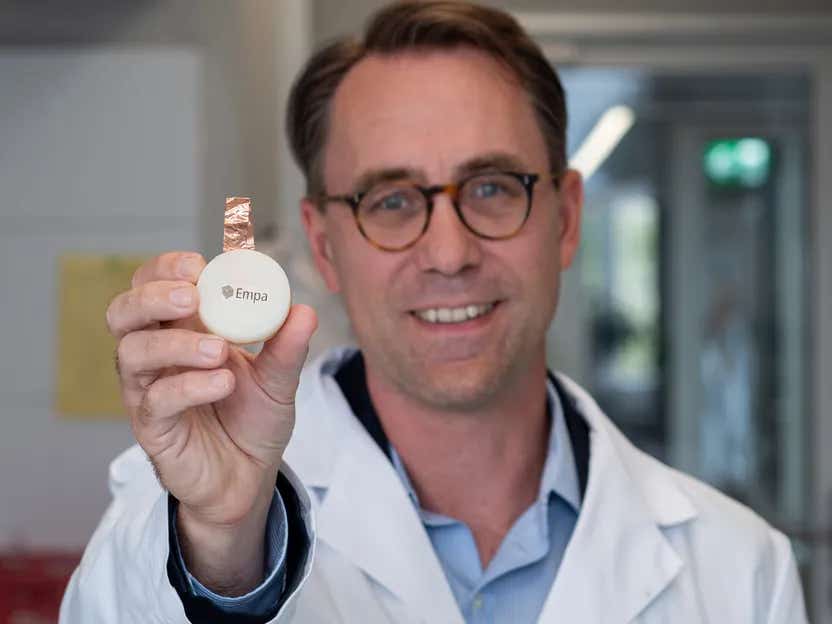Major study reveals connection between gut health and Alzheimer’s disease
A recent study from UNLV sheds light on the potential connection between gut health and Alzheimer’s disease.

A recent study from UNLV sheds light on the potential connection between gut health and Alzheimer's disease. (CREDIT: Creative Commons)
Could altering your diet affect the progression of dementia? A recent study from UNLV sheds light on the potential connection between gut health and Alzheimer's disease.
Led by researchers from the Nevada Institute of Personalized Medicine (NIPM) at UNLV and published in Scientific Reports, the study delved into existing research on the relationship between the gut and the brain. What they found strengthens the hypothesis that gut bacteria could play a role in Alzheimer's disease.
The human gut houses between 500 to 1,000 species of bacteria, influenced by both genetics and diet. Analyzing data from multiple studies, the UNLV team identified a significant correlation between specific gut bacteria and Alzheimer's risk. Six types of bacteria were deemed protective, while four were considered risk factors.
Normalized PRSs for ten significant genera between AD cases and controls in the discovery sample. (CREDIT: Scientific Reports)
These bacteria can produce acids and toxins that affect the gut lining, interact with certain genes like APOE—a known risk factor for Alzheimer's—and trigger inflammation in the brain, potentially contributing to the disease's development.
According to UNLV research professor Jingchun Chen, an imbalance in gut bacteria can impact the immune system and is associated with various diseases, including Alzheimer's.
Chen emphasizes that genes not only influence disease risk but also affect gut bacteria composition.
Related Stories
While the study identified broad categories of bacteria linked to Alzheimer's, further research is needed to pinpoint specific species.
The ultimate goal is to develop personalized treatments tailored to individual genetic profiles, potentially including medication and lifestyle changes.
Davis Cammann, lead author of the study and a graduate student at UNLV, highlights the need for additional research to understand how lifestyle and diet influence the gut microbiome's impact on Alzheimer's risk.
He suggests that with more study, it could be possible to predict a person's Alzheimer's risk based on their gut microbiome and genetic makeup.
Studies have shown that changes in diet and probiotic use can positively affect the gut microbiome, inflammation, and brain function. These findings underscore the importance of further research into the gut-brain connection and its potential implications for Alzheimer's prevention and treatment.
In addition to faculty, undergraduate, and graduate student researchers from NIPM, scientists from the UNLV College of Sciences, UNLV School of Dental Medicine, UNLV School of Integrated Health Sciences’ Department of Brain Health, Kirk Kerkorian School of Medicine at UNLV, Columbia University, and University of Texas Health Science Center at Houston contributed to the study.
Who has Alzheimer’s Disease?
In 2020, as many as 5.8 million Americans were living with Alzheimer’s disease.
Younger people may get Alzheimer’s disease, but it is less common.
The number of people living with the disease doubles every 5 years beyond age 65.
This number is projected to nearly triple to 14 million people by 2060.
Symptoms of the disease can first appear after age 60, and the risk increases with age.
What is known about Alzheimer’s Disease?
Scientists do not yet fully understand what causes Alzheimer’s disease. There likely is not a single cause but rather several factors that can affect each person differently.
Age is the best known risk factor for Alzheimer’s disease.
Family history—researchers believe that genetics may play a role in developing Alzheimer’s disease. However, genes do not equal destiny. A healthy lifestyle may help reduce your risk of developing Alzheimer’s disease. Two large, long term studies indicate that adequate physical activity, a nutritious diet, limited alcohol consumption, and not smoking may help people.
Changes in the brain can begin years before the first symptoms appear.
Researchers are studying whether education, diet, and environment play a role in developing Alzheimer’s disease.
There is growing scientific evidence that healthy behaviors, which have been shown to prevent cancer, diabetes, and heart disease, may also reduce risk for subjective cognitive decline.
What is the burden of Alzheimer’s disease in the United States?
Alzheimer’s disease is one of the top 10 leading causes of death in the United States.
The 6th leading cause of death among US adults.
The 5th leading cause of death among adults aged 65 years or older.
In 2020, an estimated 5.8 million Americans aged 65 years or older had Alzheimer’s disease. This number is projected to nearly triple to 14 million people by 2060.
In 2010, the costs of treating Alzheimer’s disease were projected to fall between $159 and $215 billion. By 2040, these costs are projected to jump to between $379 and more than $500 billion annually.
Death rates for Alzheimer’s disease are increasing, unlike heart disease and cancer death rates that are on the decline.
Dementia, including Alzheimer’s disease, has been shown to be under-reported in death certificates and therefore the proportion of older people who die from Alzheimer’s may be considerably higher.
For more science news stories check out our New Discoveries section at The Brighter Side of News.
Note: Materials provided above by The Brighter Side of News. Content may be edited for style and length.
Like these kind of feel good stories? Get the Brighter Side of News' newsletter.
Joshua Shavit
Science & Technology Writer | AI and Robotics Reporter
Joshua Shavit is a Los Angeles-based science and technology writer with a passion for exploring the breakthroughs shaping the future. As a contributor to The Brighter Side of News, he focuses on positive and transformative advancements in AI, technology, physics, engineering, robotics and space science. Joshua is currently working towards a Bachelor of Science in Business Administration at the University of California, Berkeley. He combines his academic background with a talent for storytelling, making complex scientific discoveries engaging and accessible. His work highlights the innovators behind the ideas, bringing readers closer to the people driving progress.



